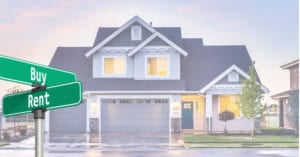Renting versus buying your home
One of the common reasons I hear for owning a house versus renting is that renting is the equivalent to “throwing money away” because you could be building equity in a house or condo instead. While owning your own home has traditionally been part of the “American Dream”, it can also lead to some unintended nightmares.
One assumption why owning is better than renting is built on the idea that house prices always increase. After 2008-2009, I think we all realized this is not true. I was one of those unfortunate home sellers who actually had to come to the closing for the sale of a house with money instead of walking away with the proceeds. Buying a house can be a way to build wealth but it’s not guaranteed!
Even with modest increases in the value of real estate, the cost of owning and the impact of making mortgage payments is often underestimated for new homeowners. Assuming you bought a house for $250,000 with a $50,000 down payment, your payment for a 30-year mortgage would be around $900 per month. A smaller down payment would increase your mortgage payment and add private mortgage insurance (PMI) premiums.
You can also expect to pay around $5,000 per year in property taxes (depending on the location) plus a similar amount for repairs and improvements (depending on the age and size of the house). This is over $1,700 per month on average (without including any utilities or homeowner’s insurance premiums).
During the first three years, your mortgage balance would decline from $200,000 to around $188,000 or about $4,000 per year. This means only around $333 of your $1,700 per month payment is going to build equity. The rest goes to interest, taxes and repairs (because remember there’s no landlord to call).
It’s only after you’ve been in the house for an extended period of time that the appreciation in price coupled with the reduction in your mortgage balance will it start to make sense financially to own a house. Therefore, I typically recommend people wait to buy until they can envision staying in a house for an extended period of time and have saved enough for the down payment.
If you’re having trouble saving for a down payment, I would think twice about buying because you’ll need to continue to save for repairs and other expenses associated with home ownership. I think waiting is even more important when you’re early in your career and may change geographic locations multiple times in the near future. Feeling stuck because you can’t sell your house to take a better job is extremely frustrating.
As seen in the Racine Journal Times | March 2020






